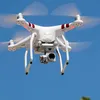Rs 120 Cr, 3 years: What drone startup founders, stakeholders think about govt incentive
The Ministry of Civil Aviation shortlisted 23 drone startups that can benefit from its production-linked incentive scheme. YourStory talked to some founders and stakeholders to understand how the policy will impact the ecosystem.
India has a budding drone industry, which is finding an increasing number of uses to offset manual work in areas such as surveillance, medicine delivery, food delivery, traffic monitoring, agriculture, etc.
The government has been taking initiatives to help the industry bloom. Last year, the central government notified the rules for drone technologies, opening up 90 percent of India's airspace for drone use.
Earlier this week, the Ministry of Civil Aviation announced that 23 drone companies were shortlisted for the new production-linked incentive (PLI) scheme worth Rs 120 crore. Some of the startups selected for the scheme include Aarav Unmanned Systems, Garuda Aerospace, IoTechWorld Aviation, Throttle Aerospace, etc.
The step comes as an affirmation of the ministry's estimates that the country's drone industry will grow to Rs 12,000-15,000 crore in turnover by 2026, from the present Rs 80 crore.
To understand what this could mean for Prime Minister Narendra Modi's vision to make India a drone hub by 2030, YourStory reached out to industry stakeholders and a few founders of startups selected as potential beneficiaries of the scheme.

A total of 23 drone startups have been shortlisted to benefit from the PLI scheme
Solving funding woes
According to Vipul Joshi, Co-founder and Vice President-Operations of one of India's oldest drone startups, , the industry wants to compete with global firms in discovering and implementing new technologies, however, funding is a hard nut to crack.
"We [ideaForge] compete with the best in the world and are committed to developing deep technology engineering skills in India to strengthen our national interests, but raising capital for developing UAV (unmanned aerial vehicle) technologies is difficult," he says, adding that the scheme will help boost funding.
Sarath Chandra Gudlavalleti, CEO of NeoSky Drones, adds that the incentive would "expedite the innovation cycle" for the industry. "Drones are a nascent industry and a lot of R&D and innovation is needed over the next few years to build strong products," he explains.
Earlier this year, NeoSky acquired a majority stake in Throttle Aerospace, which has been chosen as one of the potential beneficiaries of the PLI scheme.
Agnishwar Jayaprakash, Founder and CEO of , further adds that the government's support for the industry could also lead to an increase in private investments.
He adds, "Schemes like PLI only reaffirm the government's faith in the indigenous drone manufacturing community, and that leads to investors and VC funds gaining confidence."
What will PLI beneficiaries receive?
To avail the benefits under the scheme, the startups first had to pass the eligibility criteria. Drone startups with an annual sales turnover of Rs 2 crore, and drone components manufacturers crossing Rs 50 lakh in turnover, could apply for the scheme. The companies also needed to show a value addition of over 40 percent of sales turnover.
Aarav Unmanned Systems (AUS) discloses that they made Rs 15 crore in revenue in the financial last year, and expect at least a 400 percent CAGR (Compound Annual Growth Rate) growth over the next three years.
Additionally, Garuda Aerospace tells YourStory that they earned revenue of around Rs 16 crore last year, with an aim to grow that number multiple times over in the current financial year.
As AUS Co-founder and CEO Vipul Singh describes, the PLI scheme's benefit will be "20 percent of the revenue from sales of drones for a financial year, minus the direct cost of manufacturing in that year." This means AUS and Garuda alone could be eligible for multiple crores a year under this scheme for the next three years.
He underlines that the drone industry has seen a 300 percent growth in revenue sales, and this scheme will only help increase "capital efficiency, leading to higher investment in business expansion, better credit facilities, better investment in R&D, and more competitive pricing."
Incentivising India as a drone hub
According to Vipul Joshi of ideaForge, "At present, foreign suppliers have little incentive to set up operations in India."
In February 2022, the Directorate General of Foreign Trade (DGFT) under the Ministry of Commerce and Industry banned the import of foreign drones in a bid to promote made-in-India drones. This, along with a lack of clear regulation until last year, convinced foreign manufacturers and investors to stay away from investing in India's drone ecosystem.
However, Joshi thinks that the PLI scheme can provide enough of an economic boost to turn things around.
Talking about the scheme, he says that it "has the potential to attract a large number of international component vendors to come to India and invest in production capacity, which will undoubtedly create a variety of opportunities in terms of jobs, technology development, manufacturing, distribution, supply chain management, and in other areas."
Looking to the future, Mridul Babbar, Co-founder and Director of Sagar Defence Engineering, points that "the programme will put India on the map" when it comes to drone manufacturing. Rather than the financial benefits, he says it was "the recognition from the government of India that made us apply for the PLI scheme."
(The story was update to correct a couple of typos)
Edited by Kanishk Singh








